Regional Gathering Celebrates Rural and Indigenous Women’s Leadership in Hidalgo
Written by Gibrán Gómez, translation by Sam Austin
Tenango de Doria, Hidalgo — On Saturday, September 6, in commemoration of International Indigenous Women’s Day (September 5), PSYDEH A.C. held its 9th Regional Gathering of Rural and Indigenous Women in Tenango de Doria, Hidalgo. This event, a nearly decade-long uninterrupted tradition (except during the pandemic period), provided a space for women from the region to amplify their voices, share knowledge, and build alliances. The gathering focused on the theme of “Care” and highlighted collaborative work underway between PSYDEH and the women from the region.
Key objectives of the event were:
- Strengthen Women’s Leadership and Voice.
- Promote Collective Learning and Exchange.
- Celebrate and Preserve Cultural Heritage.
- Build Networks and Alliances.
- Ensure Collective Care and Sustainability.

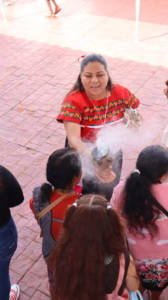
Participation and Representation
The event brought together 72 rural and indigenous women, cooperativists, allies, and collaborators of PSYDEH from the Sierra Madre Cooperative Network, representing 10 communities from the municipalities of Huehuetla, San Bartolo Tutotepec, and Tenango de Doria. Also attending were two women’s groups: the Collective Sembrando Desde el Cafetal (Colectivo Adelitas) from Tenango de Doria, and the Sohuame Tlatzonkime group from the municipality of Pahuatlán, Puebla.
A formal invitation was extended to officials from the three municipalities comprising the Otomí-Tepehua region, including those responsible for Culture, Municipal DIF (Women’s Office), Indigenous Affairs, and Social Development departments. However, despite confirmations received, the majority of these officials did not attend.
The following table details the officials who did not attend, highlighting the limited representation and response from local authorities:
| Representative | Position | Municipality/Level of Representation |
| Martha López Paricio | Municipal President | Tenango de Doria |
| Mariano Molina Lucas | Head of Culture | Tenango de Doria |
| Itzel Carolina Santos | Head of Social Development | Tenango de Doria |
| Ubaldo González Vargas | Municipal President | San Bartolo Tutotepec |
| Salomón Trejo García | Indigenous Affairs Director | San Bartolo Tutotepec |
| Magali Osorio Martínez | Women’s Office | San Bartolo Tutotepec |
| Yaralen Cortes Mendoza | Municipal President | Huehuetla |
| José Luis Victoriano | Presidential Secretary | Huehuetla |
| Yarabi Gonzaléz Martínez | Deputy District IX | Hidalgo State Congress |
Despite this notable absence, the gathering counted on the valuable presence of representatives from various institutions and organizations. Special guests in attendance included:
| Name | Institution |
| Angel Delgdillo Alarcón | Head of the Otomí Tepehua Regional Cultural Center, State Council for Culture and Arts of Hidalgo. |
| Ana Karina Gómez Ramírez | Coordinator of the Childhood and Youth Commission, Indigenous Women’s Association for Integral Development (AMIDI), representing the National Coordinator of Indigenous Women (CONAMI). |
| Leticia Segura Ordaz | COLPOS academic and administrator, Montecillo, Texcoco. Representing the PSYDEH-COLPOS Regional Alliance. |
| Gabriela Ortiz Cordero | Coordinator of the Operating Team of NODESS Tulancingo, Polytechnic University of Tulancingo. |
| Misael Soto Escorcia | Responsible for systematization of reports, NODESS Tulancingo, Polytechnic University of Tulancingo. |
| Cesar Marcos Ortega | Executive, Human Rights Commission of the State of Hidalgo. Representing President Ana Karen Parra Bonilla. |
| Briseida Eugenia Martínez | Representative, Human Rights Commission of the State of Hidalgo. |
| Gabriela de la Cruz | Representing the Indigenous 3D and Raíz de la Tierra Collective. |
| Felicia Tlalacalco Martínez | Founder, Tourist Operator FFF – Rural and Indigenous Tourism, Acaxochitlán, Hidalgo. |
| Fulgencio Vargas Vargas | Founder, Tourist Operator FFF – Rural and Indigenous Tourism, Acaxochitlán, Hidalgo. |
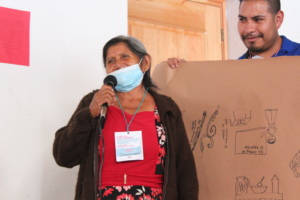
Event Development and Key Activities
The event began at 10:00 a.m. at the Otomí Tepehua Regional Cultural Center with a welcome ceremony led by Alejandra Ríos Pérez. Due to the absence of municipal authorities, Alejandra declared the 9th Gathering open and immediately proceeded with a ceremony held in the inner courtyard.The ceremony included the Tlalmanalli, a traditional offering with regional elements such as flowers, seeds, and fruits arranged in a spiral, representing both regional weaving traditions and how our lives are woven together. This ceremony, led by Felicia Tlalacalco Martínez with support from Leslie Pérez, sought to “ground” participants, encouraging presence through stretching and breathing exercises. It asked permission from the four cardinal directions (referencing Toltec influences on indigenous peoples of central Mexico). The four elements: air, water, fire, and earth, were represented through objects within the ceremony. Beginning in the east (where the Sun rises), the ritual then turns to the south, west, and north, before turning towards the sky and earth, requesting permission from guardians of each direction. Thus, the Tlalmanalli was offered.
Before re-entering the venue, each guest received a cleansing using incense to mark a renewed energy. Guided respectfully, with deep regional knowledge of customs, this ritual engaged all present, from children to elders, with the elements and ancestors.
At the entrance, handcrafted rosaries were given to all at the presiding table and the organizing team. During the inauguration, Executive Cesar Marcos Ortega of the Human Rights Commission of the State of Hidalgo highlighted the historic role of women in human rights struggles, emphasizing that International Indigenous Women’s Day is a call to action, not just a commemoration. The ceremony facilitator, Felicia, responded to forum questions about her experience with care as an indigenous rural woman, respecting traditions and her work promoting culture and environmental defense through her enterprise Operadora Turística FFF – Rural and Indigenous Tourism. She shared that the pivotal change in her preservation efforts was realizing that knowledge must be cared for through dissemination, community, and exchange. This opening agenda was coordinated by PSYDEH’s Ruta Red Sierra Madre Initiative.
The morning agenda also featured a traditional garment exhibit coordinated by the Marca Red Sierra Madre Initiative, showcasing the region’s cultural wealth through pieces that used scrap fabric, cross-stitching, and Tenangos embroidery. Each garment was contributed by participating women, representing their original communities. Concurrently, the Tech for All initiative set up a demonstration area to illustrate the work underway to improve access to technology and the internet in each community hosting cooperatives of the Sierra Madre Network.
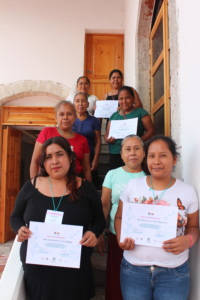
Recognition of Community Projects from the Sierra Solidaria Fund
An emotional highlight was the awarding of recognitions to projects supported by the Sierra Solidaria Fund, a PSYDEH initiative aiding collective textile and agricultural production projects. The awards were presented by PSYDEH’s Executive Director, Jorge Echeverria Merlo. Established in March 2025, the fund recognized the following projects in its first edition, with grants ranging from 10,000 to 20,000 pesos:
- Textile and branding project for the Collective Adelitas, named “Tejiendo Desde el Cafetal,” producing and embroidering bags, spoon holders, and sweatshirts.
- Poultry raising project driven by 10 members of the Yu Danxu Mpefi Di Toi cooperative in Piedra Ancha, San Bartolo Tutotepec, focused on self-consumption and local sale of meat and eggs.
- Pig farming project led by 17 members of the Ya Bombe´Uedi ko na Mu´i cooperative from Santa Inés and San Esteban, Huehuetla, aimed at meeting meat demand for specific events and generating savings and investment for families.
- Mushroom (shiitake) production initiative proposed by 11 members of the Tierra de Bordadoras cooperative from El Damo, San Nicolás, San Pablo el Grande, Santa María, and Tenango de Doria’s municipal seat, seeking a sustainable production alternative.
Project representatives shared their progress, emphasizing the importance of external support and their commitment to producing and venturing into autonomous projects—a message especially directed at the absent authorities.
Workshops on Care: A Space for Reflection and Action
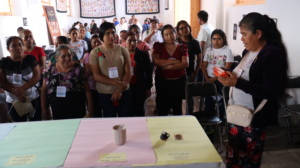
The afternoon focused on two workshops addressing the theme of “Care,” designed for participants with support from PSYDEH’s active initiatives (Ruta Red Sierra Madre, Marca Red Sierra Madre, Sierra Solidaria, and Nosotras Decidimos) and Dr. Leticia Segura (COLPOS). The purpose of the workshops was to encourage reflection amongst the members and propose concrete actions.
Workshop 1: “Guardians of Care”
The main objective was to collectively reflect on the meaning of care and how it manifests in PSYDEH initiatives. Through practical activities, participants explored:
- What does care represent? Participants interacted with physical objects on the table to identify what care means to them.
- Identifying where care is lacking: They placed beads on items or spaces where they felt care was missing.
- Commitments and actions: Based on the question, “How can each initiative help us care in these areas? What small commitments or actions could we take?”, participants shared steps and concrete proposals for PSYDEH initiatives to address their needs.
Reflections centered on values present in personal and community care, the responsibilities involved, limitations, and facilitators to care for themselves, their families, and their environments.
Workshop 2: “Right to Care”
This workshop aimed to collectively recognize that everyone has the right to provide care, be cared for, and care for themselves. It sought to transform their reflections into a product that can strengthen Indigenous women’s participation in the region.
Activities focused on two main goals:
- Promote demands to municipal authorities to guarantee the right to care.
- Identify community alternatives that strengthen women’s organization around care.
Using a card exercise with key questions (“Who cares?”, “Who should care?”, “Where is care given?”, and “Who else is responsible for care?”), participants identified and discussed the Government’s obligations to upholding their right to care as Indigenous women, mothers, and community members.
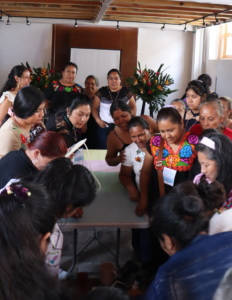
Tenangos Drawing Workshop
The event’s Drawing Workshop offered members a space to explore care from an intimate, personal perspective. The sole guideline was for each participant to draw whatever represented care to them—an open invitation for free and unconventional reflection and sharing. Four large sheets of paper were placed in the center of the room for collective drawing by all participants.
This dynamic enabled broad and intergenerational participation—from children to elders—all feeling called to express themselves. Each pen stroke offered a unique view on what it means to care and be cared for. For example, an elderly woman drew daily household chores as a symbol of care she offers her family and herself. A young woman depicted herself watering flowers in her garden. Others chose to show themselves surrounded by family and friends.
At the end, the four sheets were covered with representations of care, clearly illustrating its three dimensions: caring for others, receiving care, and self-care. Each drawing sparked new conversations among members and with the PSYDEH team, expanding collective understanding of what care can mean and how it is expressed daily.
Declaration 2025
The event culminated in the reading of the 2025 Declaration of Rural and Indigenous Women from the Otomí-Tepehua-Nahua Region of Hidalgo State. Seven women representing communities and collectives present read the document, which outlined challenges and needs faced as Indigenous and rural women.
The declaration, voiced by girls and women of various ages, powerfully expressed the systemic violence stemming from authorities’ rejection and disinterest in representing their voices and responding to their demands. It emphasized women’s vital role in community as well as the politics and practices of care.
Once again, the event lamented that authorities preferred absence over listening to their citizens’ voices.
The full document can be consulted here:
2025 Declaration of Indigenous Women from the Otomí-Tepehua-Nahua Region of Hidalgo State
The 9th Regional Gathering concluded at 3:00 p.m. with food provided by women from the Sohuame Tlatzonkime collective of Pahuatlán.
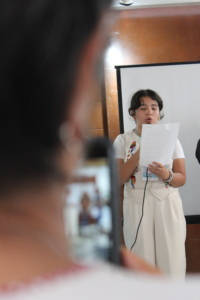
Acknowledgments
This event was made possible thanks to the important support of:
- Leticia Segura Ordaz: COLPOS academic, Montecillo campus.
- Angel Delgadillo Alarcón: Head of the Otomí-Tepehua Regional Cultural Center.
- Felicia Tlalacalco Martínez & Fulgencio Vargas Vargas: Founders of Operadora Turística FFF – Rural and Indigenous Tourism.
- PSYDEH Sierra Madre Cooperative Network: Yu Danxu Mpefi Di Toi, Ya Bombe´Uedi ko na Mu´i, Tierra de Bordadoras, and Sohuame Tlatzonkime.
- Colectivo Adelitas: Coffee and textile producers, Tenango de Doria.
